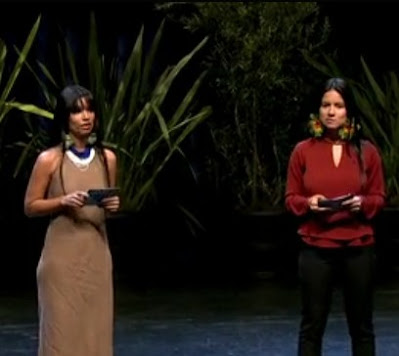Sisters in Defense of the Amazon Rainforest: Oil Companies Bring Terror to Ecuadorian Amazon, at Bioneers
By Brenda Norrell
Censored News
In the Headwaters of the Amazon.
In the Headwaters of the Amazon.
"They blew up the ground and blew away the spirits of our ancestors."
They tortured her relatives and threatened to rape the young girls.
Nina Gualinga, and her sister Helena, told the Bioneers Conference of the terror, and climate change, that the oil companies had brought to their community of Sarayaku, where they swam in the Bobonaza River as children.
The oil company offered to buy the land for what would have been $10 per person.
Nina said the oil company and the government of Ecuador violated their rights, and her small community of Sarayaku in the Amazon Rainforest took them to court. The victory in the Inter-American Court of Human Rights in 2012 set precedence and was everything they hoped for.
Nina was a young girl when the devastation began. She vowed to not let the destruction continue.
Then, when the pandemic hit, there was a massive flood.
Helena Gualinga said, "What caused the flood? Climate change."
"What causes climate change: Fossil fuel extraction."
Then, a massive oil spill here in the headwaters of the Amazon devastated the region. In two days, this oil had reached Peru. Children had rashes on their bodies. Neither the government nor the oil company informed the people.
"This is happening while a pandemic is going on," Helena said.
People could no longer drink the water, or take baths in the rivers.
"We hunt and fish. The animals drink the water we drink." It was a complete violation of their lives.
Where was this oil going? Fifty percent of Amazon crude oil went to California, to the Chevron oil refinery.
In September, the government of Ecuador plans to auction off the rest of the Amazon to oil companies.
"We need to make sure that doesn't happen. We need to prevent other oil spills from happening."
"We can not continue killing Indigenous children."
Indigenous people are safeguarding the Amazon, safeguarding the planet.
"We can protect the rainforest. But we can only do it if we permit and support the custodianship that Indigenous people already have over our own territories," Helena said.
The sisters spoke at the annual Bioneers Conference in San Francisco, which was also broadcast virtually.
The Victory in Court
The Victory in Court
In 2012, the Inter-American Court of Human Rights ruled in favor of the Sarayaku in the case of Sarayaku v. Ecuador, affirming and upholding the right of free, prior and informed consent (FPIC) of Indigenous Peoples. It marked the end of a decade-long legal battle the Sarayaku have been fighting since a foreign oil company was allowed to encroach on their traditional lands in the 1990s.
Nina Gualinga is an Indigenous woman defender of the Amazon from the Kichwa community of Sarayaku in the Ecuadorian Amazon who advocates for women’s rights and climate justice. She is an international spokeswoman for Mujeres Amazonicas and the Women Defenders Program Coordinator at Amazon Watch.
Helena Gualinga is an Indigenous youth environmental and climate justice advocate from the Kichwa community of Sarayaku. She is a co-founder of Polluters Out and is a Young Women Project Lead with WECAN. Her work and story is featured in the recently released documentary, "Helena from Sarayaku," which premiered at the DC Environmental Film Festival.
Censored News original series from talks and panels at Bioneers
Sikowis and Nick Estes:
The Failed System, Schemes of Non-Profits and a Regenerative Future
Sisters in Defense of Amazon Rainforest
Oil Companies Bring Terror to Ecuadorian Amazon
Rights of Nature Attorneys Describe Emerging Movement in Indian Country
Article copyright Censored News


No comments:
Post a Comment